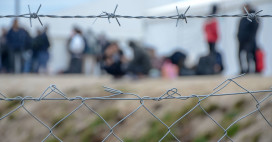
Sara Medrano was living in Romania with the parents of her partner, together with her 4-year-old daughter and a new-born baby, when she was arrested through a European Arrest Warrant (EAW), issued by Alicante Provincial Court in Spain.
Sara’s lawyer spent a considerable amount of time requesting the Spanish court to reconsider the possibility of withdrawing the EAW and authorizing her to voluntarily return to Spain by her own means for the trial. However, the court ignored their requests, Sara said.
Surrender took place on 8 April 2016 and the Alicante Court maintained pre-trial detention until the date of the trial scheduled for 1 June 2016. The trial was held via videoconference with Alicante from prison in Aranjuez, Madrid, where Sara was imprisoned with her baby, and she accepted the guilty judgment.
Pre-trial detention is supposed to be a measure of last resort. Clearly there were other alternative measures to pre-trial detention in view of the minimal flight risk with a six-month-old baby and a four-year-old daughter staying with grandparents in Alicante.
Sara said: “I was very worried about my daughter, who had never been separated from me. I did not see her while I was in prison. My parents came to see me once in prison; travelling from Alicante was a major issue for them.”
But from the information obtained during Fair Trials’ research, there is no record of Spanish courts trying to obtain an interview through other cooperation channels, prior to taking the European Arrest Warrant route.
Despite being justified by her family situation and the fact that she was perfectly located, on supervised release ordered by the competent Romanian authority, the Spanish court issuing the EAW was unreceptive to the lawyer’s request for the EAW to be cancelled and for Sara to travel to Spain voluntarily within a term of one month.
Moreover, the EAW had been issued for a trial to be held. Yet the trial was held without the need for Sara to be physically present in Alicante as it was carried out via videoconference, no evidence was examined and the sentence of 1 year and 6 months’ imprisonment has not yet been enforced. This highlights that less onerous alternative measures could have been adopted that would not have affected Sara’s family situation.
Sara has not received final word from the court and may yet have to return to prison with her youngest two children. The eldest will stay with Sara’s parents in Alicante because she is too old to be allowed to accompany her mother to prison.
Recalling her last experience in detention and contemplating her eventual return, Sara said:
“I had never abandoned them before. So, she would ask me why it took me so long to come home [when Sara was jailed earlier] when I spoke with her on the phone. ‘I’m working,’ I’d say. Now, I need to get help from my mother and my mother-in-law, so the girl doesn’t feel that life has changed. She doesn’t understand why I’ll take her sister and brother with me.
I’m taking my two-year-old and the 8-month-old baby, but they don’t allow my six-year-old daughter to come with me. My son is going to get traumatized, the two-year-old. Just imagine the change. He’s really active, used to run around everywhere in the house as he pleases, but over there, he’ll have to be quiet because the other kids are sleeping, he’ll have to eat at certain times, he’ll have go to kindergarten outside the prison.
Both of them will be required to go to the kindergarten outside the prison. I’ll be left behind… I’ll just wait for them to come from the kindergarten, just killing time until they arrive.”


